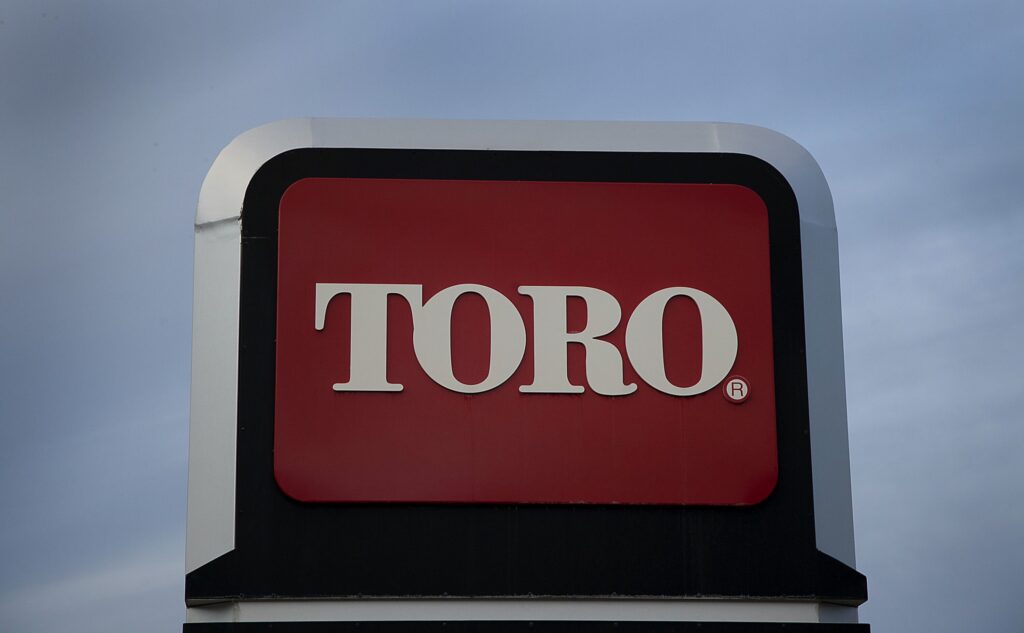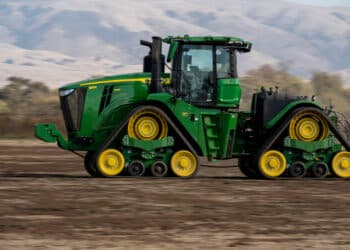Outdoor power equipment manufacturer The Toro Company saw a decline in financing originations for its finance joint venture in the first quarter as the manufacturer’s professional sales declined due to supply chain-related delays.
BY THE NUMBERS: Red Iron, a financing joint venture owned 45% by Toro and 55% by Huntington Distribution Finance, experienced a decline in originations during the first quarter of its fiscal year 2024, which ended Feb. 2, according to Toro’s 10-Q filing with the Securities and Exchange Commission. Despite the decline in Red Iron’s originations, Toro saw an increase in other customer financing metrics. According to the 10-Q:
- Net receivables financed for dealers and distributors under Red Iron for Q1 totaled $425.6 million, down 36.9% year over year;
- Total Red Iron outstandings landed at $963.9 million, up 2.3% YoY;
- Total receivables due from Red Iron to Toro were $25.6 million, up 48% YoY;
- Net receivables financed for dealers and distributors by third-party financial institutions reached $131.0 million, up 17.7% YoY;
- Total third-party financial institutions’ outstandings finished Q1 at $202.6 million, up 22% YoY;
- Toro’s total investment in Red Iron after Q1 reached $48.4 million, up 5.9% YoY.
Meanwhile, Toro’s net sales and professional segment sales declined in Q1, according to the company’s earnings presentation:
- Total net sales landed at $1 billion, down 12.8% YoY;
- Professional segment net sales dropped to $756.5 million, down 14.1% YoY;
- The professional segment’s earnings rate as a percentage of net sales declined to 14.9%, down 150 basis points YoY.
WHAT THEY’RE SAYING:
While the Q1 sales results and the possibility of weather-related issues in the second quarter provide reasons for concern, Toro’s overall financial performance is in line with market expectations, generating a sense of optimism for the company, according to a Raymond James research note.
“2024 spring weather could still be a source of either upside or downside to near-term results, much as adverse winter weather impacted snow-related sales,” according to the note. “We believe these tailwinds to longer-term earnings growth, combined with the recent dip in valuation, represent a favorable risk-reward scenario.”
STATE OF PLAY: The overall negative impact of supply chain issues pushed the company’s sales down, Richard OIson, chairman and chief executive of The Toro Company, said during the company’s March 7 earnings call.
“The strength in our construction and golf and grounds businesses was offset by lower shipments of zero-turn mowers as expected, given elevated field inventories heading into the fiscal year,” he said. “The strength was also offset by lower shipments of snow and ice management products due to the low average snowfall. In addition, our results were affected by a few supply chain issues that delayed shipments for select product categories in our professional segment.”

NOTEWORTHY:
The Toro Company expects net sales to be similar or slightly better in the second quarter compared with the same period last year, despite an expected decline in professional segment sales, Angela Drake, vice president and chief financial officer of the Toro Company, said during the company’s earnings call.
“In the second quarter of fiscal 2023, we benefited from dealer and distributor inventory replenishment of contractor-grade zero-turn mowers, following a period of constrained supply,” she said. “The same dynamic is not present this year. We anticipate this will be more than offset by expected incremental benefits from our expanded mass retail channel and our focus on driving increased output for our businesses with elevated order backlog.”
MARKET REACTION: Shares of The Toro Company (NYSE: TTC) were up 0.78% from market open to $89.23 as of market close today. The Toro Company has a market capitalization of $9.32 billion.
FUTURE LOOK: The Toro Company continues to invest in new technology, including:
- Alternative power solutions;
- Smart connected solutions; and
- Autonomous solutions such as the autonomous hybrid fairway mower.
THE BOTTOM LINE: Toro continues to navigate the traditional and macroeconomic environments as the nature of the equipment industry provides an economic backstop, Olson said.
“From a macro perspective, we are closely watching business and consumer confidence and spending patterns, as well as monetary policy actions, inflation, numerous upcoming elections and the current geopolitical environment,” he said. “We also expect continued benefits from the essential nature and regular replacement cycle of our products.”
Registration is now open for Equipment Finance Connect, the nation’s only dealer-centric equipment lending and leasing event, which will take place May 5-7 in Nashville, Tenn. Learn about the event and free dealer registration at EquipmentFinanceConnect.com.









